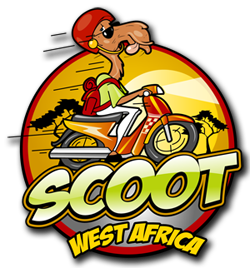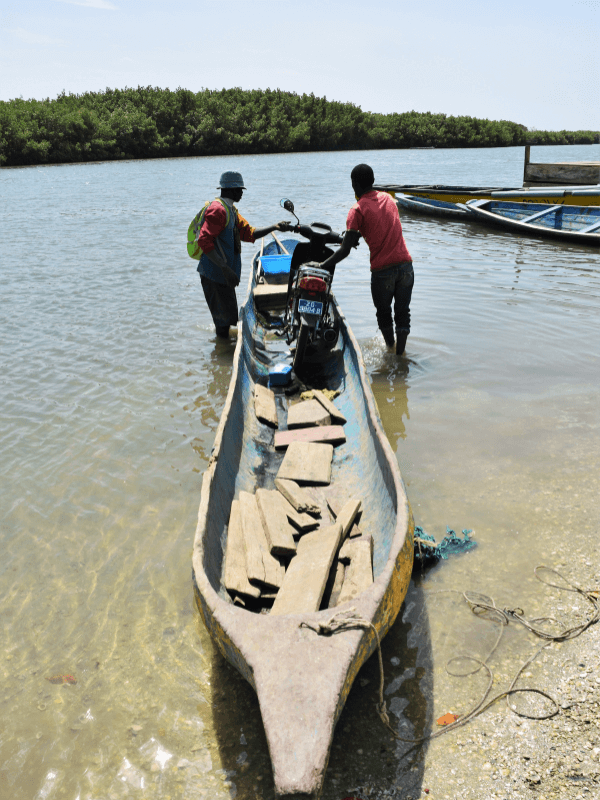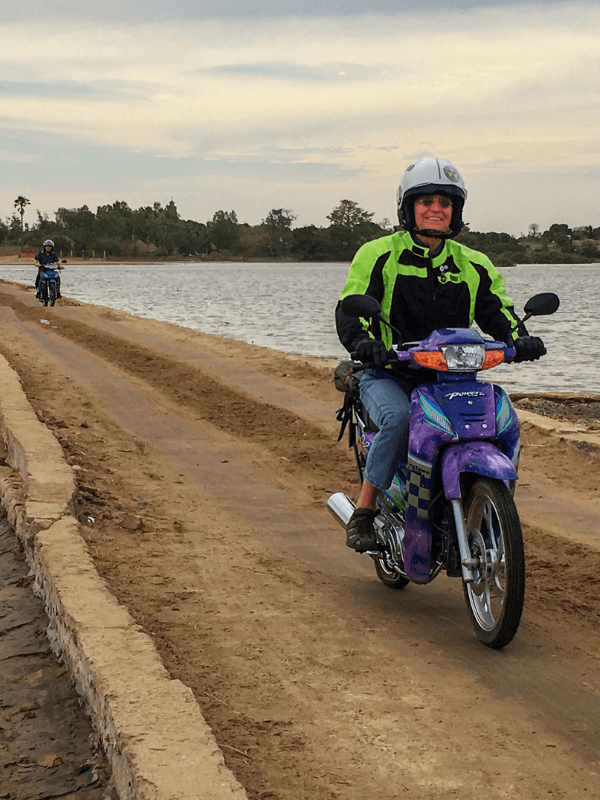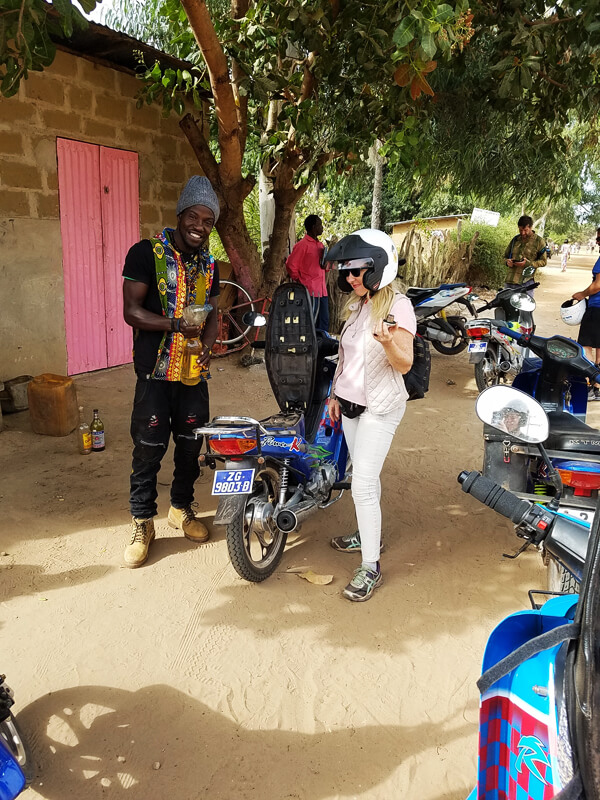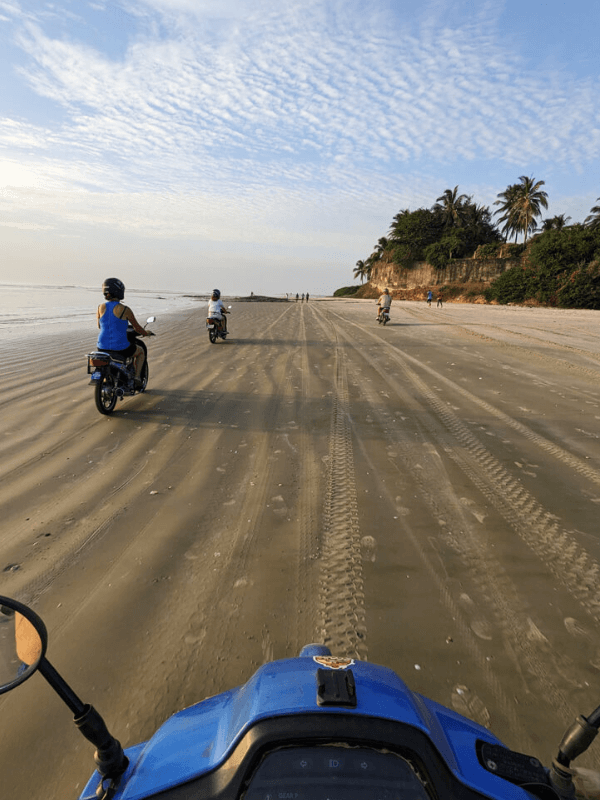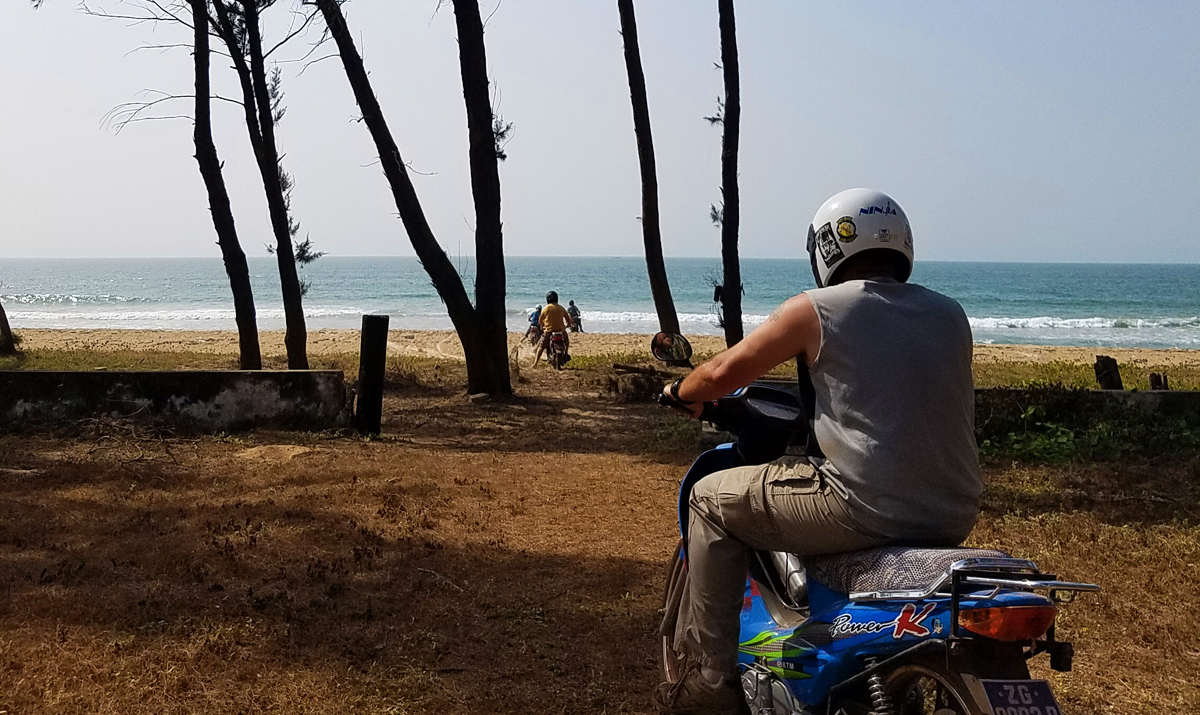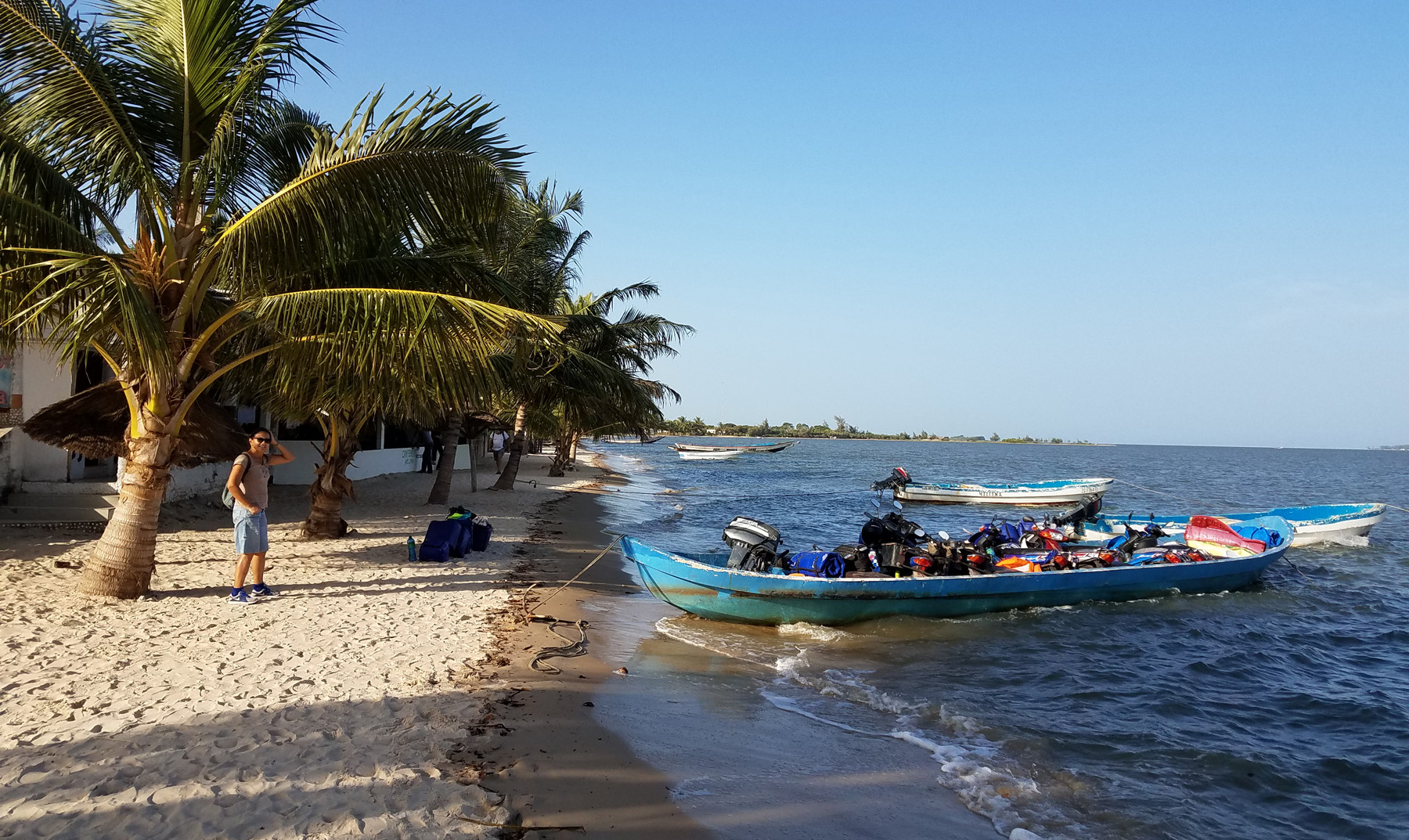
Jaam Rek: One week Tour of Senegal and The Gambia
A great introduction to West Africa and the perfect way to discover the diverse culture, food and music in this corner of the world.
Our most popular trip for a reason. Easy to moderate riding on incredibly diverse terrain, from salt flats and jungle to beaches and off-road dirt track. We cover two different countries, but it might as well be three — Casamance, Senegal’s southern province, is a world apart.
We begin on the coast
The trip starts in the beachside town of Somone. Closer to the airport than Dakar, it is a convenient jumping off point for destinations further south.
Arriving in Somone
Hemmed in by salt flats, a magnificent stretch of beach and a sprawling nature reserve with a mangrove-ringed lagoon as its centerpiece, La Somone is the rare touristy beach town that is not overrun and overdeveloped. There are water activities galore, accessible walks and hikes and plenty of bars and restaurants. You should plan on arriving in Somone no later than the night before the trip begins, but if you have the time it’s not difficult to keep yourself occupied here for a day or two. We can help you organize lodging and airport pickup as needed.
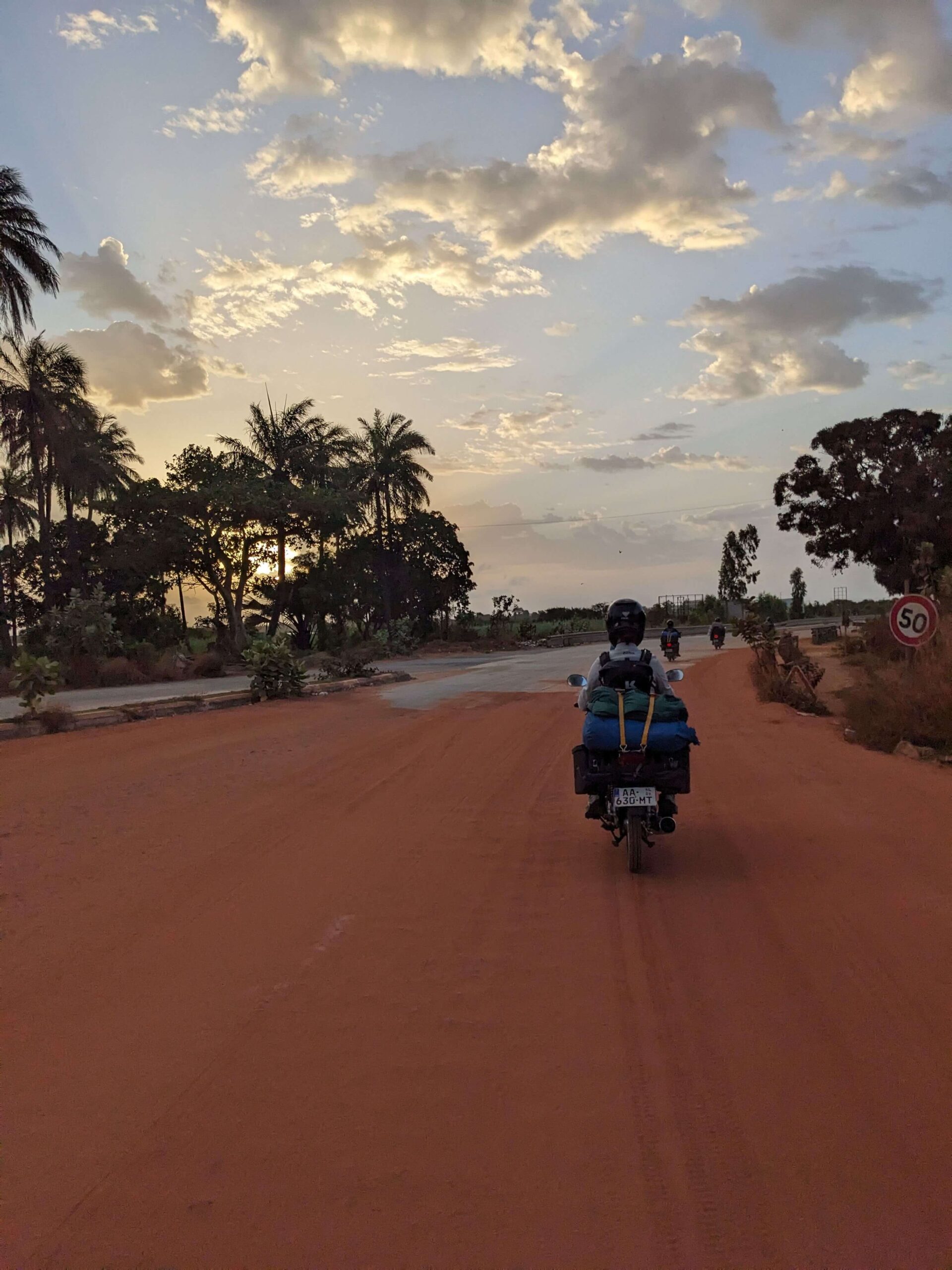
Itinerary
Please see our philosophy on itineraries. Changes can be made depending on local conditions, spontaneous discoveries that can happen on the road, and the considerations of the group.
Day 1
After a relaxed orientation with the bikes, we will cruise down the coast towards Joal and its sister village of Fadiouth, perched atop a man-made island built entirely out of seashells. After visiting the island, we will have lunch next to the lagoon before making our way inland to the Sine-Saloum delta. The road ends at the jetty in Ndangane, where we will hop on a boat and cross the channel to the island of Mar Lodj, which promises an exceptionally soft landing after our first day on the bikes. Swimming, kayaking and relaxing in a hammock are all possibilities as we watch the sun set over the mangroves and share stories from our first day of riding.
Day 2
We will cross to the other side of Mar Lodj before taking a short boat ride across the channel to Ndangane. We will cross the Serrer heartland today, navigating salt flats and laterite roads that will lead us deeper into the Sine-Saloum. As we make our way to Toubakouta, we will keep our eyes peeled for green monkeys that often scramble across the tarmac. We will once again finish the day on the water, sundowners in hand, with another round of stories to share.
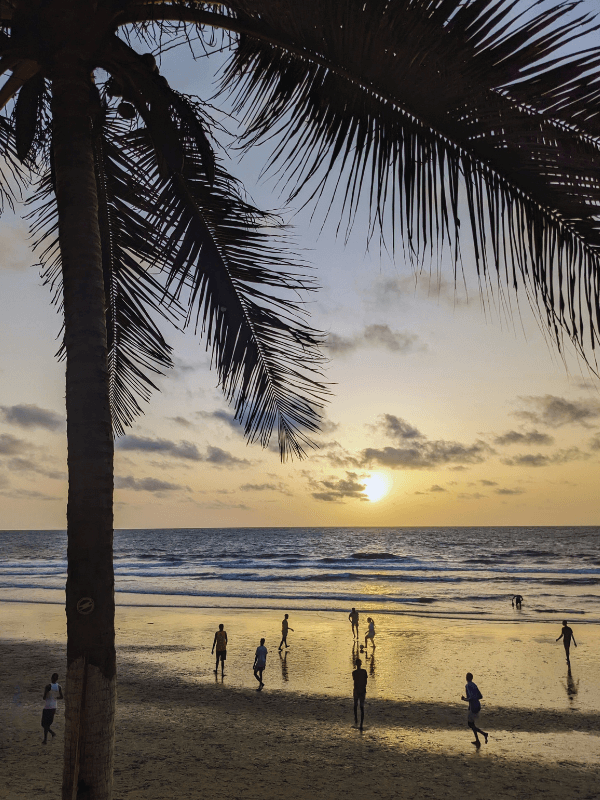
Crossing into The Gambia
Day 3
After a leisurely breakfast looking out over the mangroves, we will pack up and head down the road to the Gambian border. After the immigration formalities, we will have a short ride to Barra, where we will catch the ferry across the Gambia River. Inevitably unpredictable, the ferry is an adventure in its own right. But with a limited number of kilometers to cover, we will have plenty of time to get to our oceanside lodging for a late afternoon refreshment, a swim and/or some beach lounging. For anyone after some nightlife, you can easily dance until dawn at the beach bars or the night clubs on the Senegambia strip.
Day 4
You will have a free morning to explore Bakau, a historic Banjul suburb known for its artisanal market and the sacred Katchikally Crocodile Pool. If you had a big night out, you can also take advantage of the light morning and catch up on some shut-eye. In the afternoon, we will head down the coast, through the Tandji bird reserve and into rural Gambia. Our lodging for the night is a unique jungle ecolodge, where we can soak up the natural surrounds, watch local craftsmen ply their trade and enjoy delicious home cooked food.
Back into Senegal
Day 5
After an optional early morning nature walk, we will have breakfast and hit the road for some bush tracks before looping back into The Gambia’s only neighbor. The sign at immigration will say “Senegal,” but the Casamance region feels like a world apart. The towering baobabs in our rear view mirror, twisting kapoks will now dot the horizon, and everything will be just a little bit greener as we cross into verdant, tropical latitudes. We will head back towards the Atlantic, to the village of Abené, a mecca for drumming and dance and the perfect place to explore Casamance’s unique ethnic and cultural mélange. We will spend a night at the Little Baobab, an ecolodge that feels more like a homestay, and a place that we have been returning to since 2017.
Day 6
After a delicious local breakfast, we will point the bikes south and make our way to Ziguinchor, the capital of the Casamance. We will traverse marshes and mangroves, villages and rice fields, eventually crossing a bridge over the mighty Casamance river. We will have a riverside lunch in Ziguinchor, keeping our eyes out for dolphins and birdlife. After lunch, we will continue south to Cap Skirring, a legendary West African beach town, where we will spend another night on the Atlantic, steps away from an expansive beach that’s often populated by more cows than people. The beach is the main attraction, but downtown Cap Skirring is also a hoot, and we will have the chance to see some local live music at one of the open air bars.
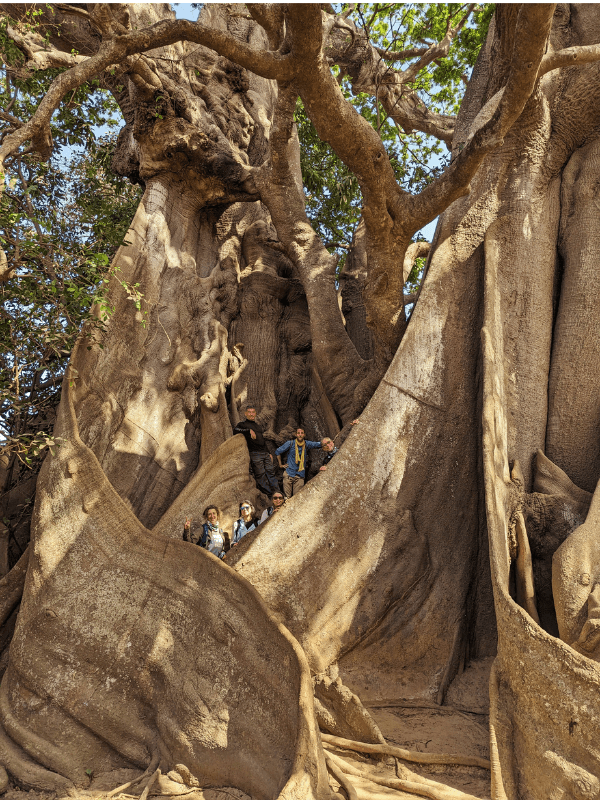
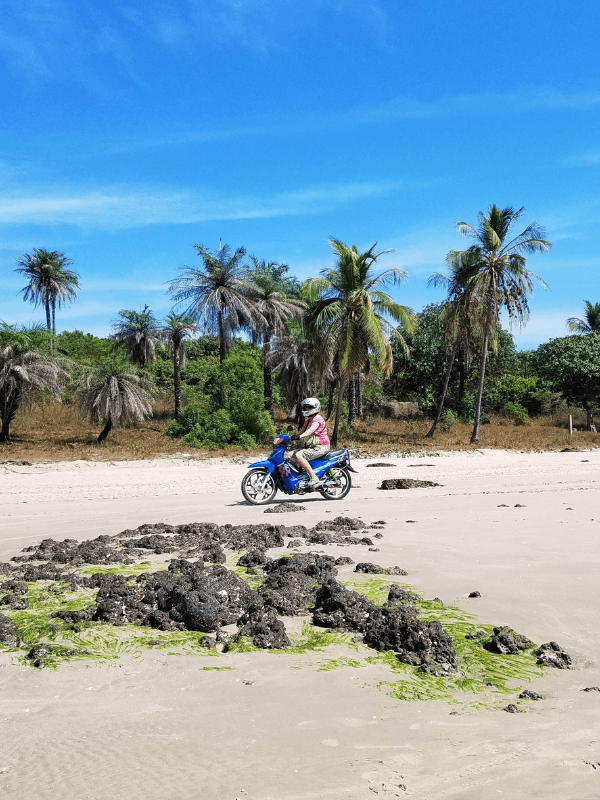
Down to Guinea-Bissau?
Day 7
We will begin our day with a relaxed breakfast in the company of palms, papaya trees and a heavenly seabreeze. We won’t be in a hurry this morning. The only thing on the agenda will be a beach ride down into Bissau-Guinean territory (there is no immigration post, but for those that are after a proper Guinea-Bissau entry, we may be able to accommodate!). Otherwise, you are free to relax, explore, souvenir shop, or continue to take advantage of the world class plage. After lunch, we will have a short ride inland to Oussouye, the only animist kingdom in Senegal. We will have the afternoon to explore this culturally rich constellation of villages and if we are lucky, we may even may be able to meet the king.
Day 8
After breakfast, we will hit the road for our last ride of the trip, a relatively short jaunt to Ziguinchor. Once we arrive, we will say goodbye to the bikes and head to the ferry that will take us back to Dakar. This boat is a bit more elaborate than the pirogues and dugout canoes we will have taken up to this point. There is a bar and restaurant on board and a sprawling upper deck with great views of Casamance riverside life. Dolphins typically surf in the wake of the boat as we cruise down the river and the sunset rarely disappoints as we head out into the Atlantic. After dinner, we will head to our cabins to get some sleep before waking up in Dakar the following day.
While the trip technically ends when we board the ferry, we can organize an optional Dakar day tour upon arrival back in the city. And anyone is of course welcome to join us for one last leisurely breakfast next to the ocean.
Our Travel Philosophy
Travel is privilege. We believe in approaching it with an open-mind and a heavy dose of respect for the local customs and cultural practices that we come in contact with. We believe in discovering a place on its own terms. We do not impose. We listen, and we learn. We are constantly aware that we are visitors. We are guests. And we should act like it.
We are also aware of the positive impact we can have as visitors. We do our best to support local establishments, artisans, guides and organizations that support their families and communities, and in many cases, drive meaningful development. Many of the places we visit receive little to no investment from outside (government or otherwise). We appreciate the fact that we are able to put money into these localities.
What to Expect
From November through February the weather is fairly consistent: lots of sun, a dry heat with daytime highs around 33°C (92 °F), and evenings and mornings that can be quite cool. In mid-March, the temperature begins to tick up and the afternoons are warm to say the least.
Please have a look at the What to Pack page for tips on clothing and sun protection.
We will be spending time in French and English speaking countries. Don’t speak French? Don’t worry. Many people speak at least a bit of English, and even if you do get stuck, a trip leader will always be close by. You will also have a chance to learn some local languages, such as Wolof and Diola.
Wherever possible, we will stay at hotels and guesthouse that introduce us to the local community. We will always choose a family run place over a chain hotel. This trip will have a mix of eco-lodges and hotels/guesthouses. At the eco-lodges, facilities will be limited but the lodging still clean and comfortable. The hotels will have regular toilets, showers, fans and air-conditioning where possible. While the first night before the trip begins is not included in the trip price, all other accommodation is included.
This trip has a difficulty of easy to moderate. Most of the roads are in good shape, and we will not be sharing the road with any rush hour traffic. In fact, most of the time, we will be sharing the road with cows, kids walking home from school and donkey carts. We will have a few stretches of sand track here and there, but we take it slow. We will also get off road on some laterite and jungle track. Again, we will take it slow and enjoy the ride.
On the first day of the trip we will have an orientation with the bikes to get comfortable with them. While we will offer plenty of guidance, you need to have some riding experience before joining us, even if you just spent a day riding a scooter somewhere on holiday.
To go on this trip, you must have a driver’s license (any regular driver’s license is fine — it does not have to be a motorcycle license for these particular bikes), and you need to have a DOT or ECE 22.05 certified helmet (more on this on the Health and Safety and What to Pack pages).
Western style food will often be available, but we will encourage you to try as much of the local cuisine as possible. This particular area of West Africa is a culinary powerhouse, from Senegal’s famous thieboudienne to fresh grilled fish and seafood in the Casamance. Everywhere we eat, the food is prepared to order and with local ingredients.
Breakfast and a number of group meals are provided. When we are staying at certain lodges, dinner will be included as part of the accommodation. There are several nights on the trip where you will have a choice of where to eat. We will make recommendations, but the food is at your expense in these instances.
Vegetarian and vegan options are limited, but we can make a plan provided you notify us in advance of the trip.
Dakar is one of the most accessible cities in the region. Its airport is served by multiple international carriers. You need to arrive by the evening before the trip begins (typically Saturday). Accommodation for Saturday night is not covered in the trip expenses. We can make recommendations depending on your budget. For your departing flight, plan to book it no earlier than the day after the trip ends (typically a Monday).
This trip does have some built in flexibility for the return leg. If another Monday off work is a dealbreaker we can arrange for you to take a flight from Ziguinchor or Cap Skirring that would get you back in time to take a flight on Sunday. This additional flight would be at your cost (a one way flight is roughly 90 euro), but we can organize everything for you in advance of the trip.
As far as the trip itself: if you are expecting a by-the-minute schedule that will be respected to the letter, this is not the trip for you. West Africa is a great place for honing your patience and learning how to improvise. It’s important to keep an open mind and be ready for anything. If you have the right attitude, you will learn to love the different challenges that may arise. For more on this, please read about us and our philosophy on itineraries.
Available Dates
These are the current open group trips. There are always more on the way, but you can also contact us if you have particular dates in mind.
Jaam Rek: Senegal, Gambia and Guinea-Bissau
Jaam Rek: Senegal, Gambia and Guinea-Bissau
The trip cost includes all lodging, transportation, breakfasts and a certain number of group meals during the trip (when the meals are included as part of our accommodation). It does not include airfare, visas, optional activities, drinks, and restaurant meals.
Jaam Rek: Senegal, Gambia and Guinea-Bissau
Jaam Rek: Senegal, Gambia and Guinea-Bissau
The trip cost includes all lodging, transportation, breakfasts and a certain number of group meals during the trip (when the meals are included as part of our accommodation). It does not include airfare, visas, optional activities, drinks, and restaurant meals.
Cost and Booking Information
The trip cost is €1750 (we do offer a discount for Senegal residents, please inquire). This cost is based on double occupancy lodging. For a single room, there is an additional €75 supplement. To secure your spot on the trip, we take a non-refundable deposit of €250. If you are unable to make it on the trip, you can use this deposit towards a future trip at a later date.
As stated above, the trip cost includes all lodging, transport, breakfasts and some lunches and dinners. It does not include airfare, visas, optional activities, drinks, restaurant meals and other food outside of the group meal.
If a trip has open spots, we will accept bookings up until departure. For trips that are full, we expect trip payment no later than two months before the trip starts. Please see our page on trip policies and cancellations.
